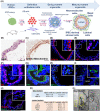Propagation of human prostate tissue from induced pluripotent stem cells
- PMID: 32170918
- PMCID: PMC7308643
- DOI: 10.1002/sctm.19-0286
Propagation of human prostate tissue from induced pluripotent stem cells
Abstract
Primary culture of human prostate organoids and patient-derived xenografts is inefficient and has limited access to clinical tissues. This hampers their use for translational study to identify new treatments. To overcome this, we established a complementary approach where rapidly proliferating and easily handled induced pluripotent stem cells enabled the generation of human prostate tissue in vivo and in vitro. By using a coculture technique with inductive urogenital sinus mesenchyme, we comprehensively recapitulated in situ 3D prostate histology, and overcame limitations in the primary culture of human prostate stem, luminal and neuroendocrine cells, as well as the stromal microenvironment. This model now unlocks new opportunities to undertake translational studies of benign and malignant prostate disease.
Keywords: androgen receptor; differentiation; induced pluripotent stem cells; organoids; prostate; prostate cancer; stem cells.
© 2020 The Authors. STEM CELLS TRANSLATIONAL MEDICINE published by Wiley Periodicals, Inc. on behalf of AlphaMed Press.
Conflict of interest statement
The authors declared no potential conflicts of interest.
Figures




References
-
- Clevers H. Modeling development and disease with organoids. Cell. 2016;165(7):1586‐1597. - PubMed
Publication types
MeSH terms
Grants and funding
LinkOut - more resources
Full Text Sources
Molecular Biology Databases

